SUMMARY
This is AI generated summarization, which may have errors. For context, always refer to the full article.
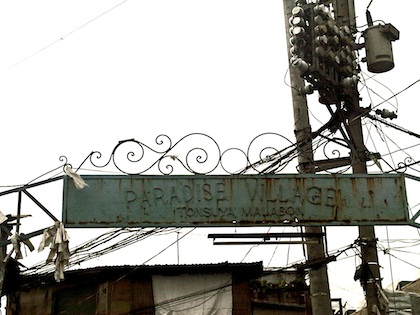
MALABON, Philippines — High walls surround the area. Along its length painted blue and teal, a palette image was drawn. Somebody wrote the word “Art.” At the foot of the wall, piles of plastic bags are scattered. Four boys are walking on the garbage, making a living from another man’s waste.
I continued to walk, along with the women from our Women and Development Studies class. We were there to see how changes have been made for the women in the community.
We were greeted by a faded tiffany blue rusted signage, “Paradise Village.” Beside was a Meralco post choking on attached electric meters.
Village of waste
In the middle of their village stands a small chapel. Lina Bacalandro, president of the Mothers Organization and Vice President of the Homeowners Association of Paradise Village, introduced us to her home place.
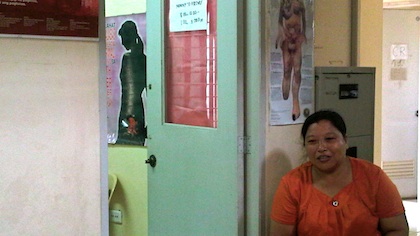
She shared that she promotes and instills traditions such as bayanihan in the community. “Ambag-ambag,” or collective effort is resorted to when a neighbor is in need. She also shared that some of the land in their community was purchased through the national project Mortgage Program.
The area used to be a “palaisdaan” (fishpond/fishpen) during the Marcos regime. Imelda Marcos spearheaded fisheries projects, building “tilapiaan” and “bangusan” in places near the water/sea.
Then she led us to the small alleys where we passed by rows of houses. I gazed at the linked roofs, the mesh of electric wires that criss-crossed the already cramped space. The lines looked like beautiful abstract art, but there is nothing pleasing about how these stand as a symbol of the inability of the government to create more efficient urban areas.
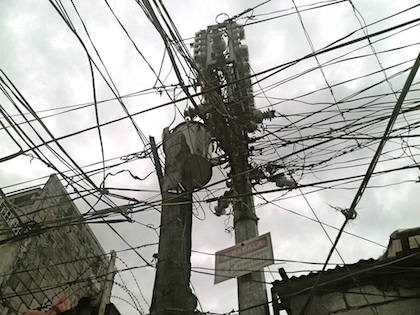
We walked through a make-shift walkway made of bags of sands, rocks and wood that led to the community. People were very kind as we greeted them, passing by their doors and windows along the way. They never tired of reminding us to be careful. “Mag-ingat kayo. ’Pag malaglag kayo, hanggang leeg ang basura!”
This was their home — a village surrounded by water, with the houses on stilts, swimming in garbage.
I asked a young woman breasfeeding her little boy, while her other hand prepares food for her other child, “Will the garbage will be taken away?” She nonchalantly said no, explaning they were used to it. And in an ironic way, the garbage helped them survive the flood, as its piles elevated their area.
Sacks of garbage were used as stepping stones, and then eventually solidified though time. Paradise Village literally stands on waste.
Shanties and sex
In the village, one house holds 4 to 5 families. You can walk through it in 30 minutes. It is a busy district with a population of 55,000, from which 21,000 are voters. Each family strives to get by. The houses we passed by were selling all sorts of things — halo-halo, kakanin, ice candies, charcoal. There were laundry services and shoe repairs.
We reached an elevated part of the garbage surface. From up there, we saw the steep hills of trash. While we stood there, children ran about naked on their playground of refuse. One boy somehow disappeared when he came to a stand still. He blended with the surroundings. Somehow, it felt heartbreaking.
Another little girl approached, picking on the plastic while stealing glances at me and I give her a smile. Ate Lina said the girl was 8 years old when she was raped by a 9-year-old boy. They were only playing house. There was penetration.
But the parents attended counseling by the barangay council and DSWD (Department of Social Welfare and Development). They were first embarrassed and hesitant. They said that the children might have been influenced by some neighbors watching porn. The flimsy wood and corrugated iron walls of shanties offer no space for privacy. Children are unwittingly exposed to sex without education.
To address this, Ate Lina built a center for young girls and women. Ate lina admitted she only finished 2nd yr high school. Before, she was afraid to ask about sex. “Tatlo ang anak ko. Sunud-sunod.” (I had 3 consecutive kids.)
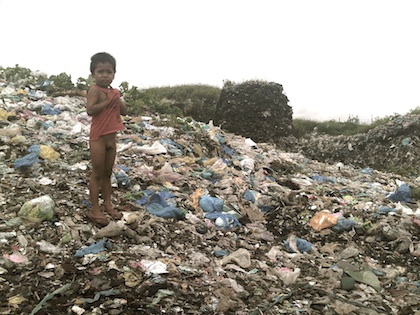
She revealed she had no access to family planning. She wanted to undergo ligation but the doctor told her she was too young at 20 years of age.
It was only through the help of health workers from Likhaan Center for Women’s Health that she finally had access to medical services — pre-natal checkups, health and sex education, and women’s rights.
“Kahit mahirap, puwede pala magtanong. Hindi dahil doctor ang nagsasalita, maniniwala ka nang hindi pwede magpa-ligate,” she recounted. Not long after, Ate Lina volunteered as a health worker for Likhaan. (You can ask questions even if you’re poor. It doesn’t mean that just because it’s the doctor speaking, you believe you can’t have a ligation.)
Through her volunteer work, she has helped many women like her who had no previous access to health care and sex education. Working in the community has made her aware of the other issues, such as sexual abuse.
She told us about two girls, aged 13 and 12, who were sexually abused. The 13-year-old was raped by her nephew. The girl’s father had a family from his first wife. The nephew/rapist was the son of the girl’s half-sibling. The 12-year-old was a lesbian who got drunk with her guy friends. They raped her. She became pregnant at 13 and gave birth at 14.
Domestic violence is also a pressing issue in their community. “Kapag away mag-asawa, ang paniniwala ay ’di dapat pakialaman.” (When it’s a marital quarrel, the belief is no one should interfere.)
Usually, everybody blames the battered woman for being hurt (as she probably asked for it) through constant nagging or plain defiance.
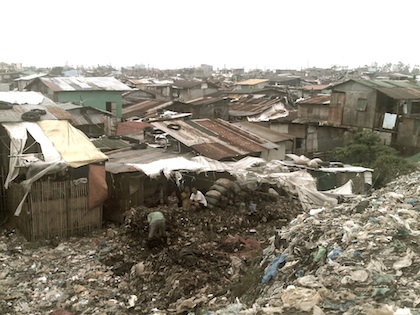
Women for women
The presence of Likhaan has already created some changes in Paradise Village. The new system is a preventive measure. The women are now encouraged to speak out, to point at perpetrators of domestic violence in their homes, and to file legal cases against whoever dares to hurt them.
Mothers Organization, a group of concerned mothers and women that Ate Lina founded based on the principles of Likhaan, has already grown to 1,300 members.
They take care of girls aged 15 years and above by promoting family planning, safe sex, and maternal health services. Free services from midwives and doctors are also made available, as is counselling on violence against women.
Another group that aimed at educating adolescents on sexual health and rights was also established, called d KKK-Kaunlaran, Kapayapaan, Katarungan para sa Kabataan.
Ate Lina and her community, through their own devices, has already helped alleviate their way of living by having access and spreading precious knowledge on birth, life, and death.
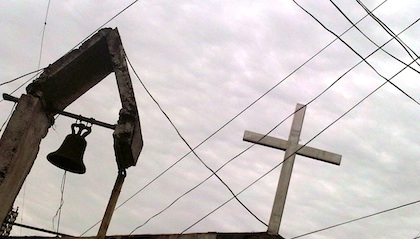
Meanwhile, outside Paradise Village, the debate over the passage of the Reproductive Health Bill is still raging. Some members of the Church and the state have been trying to hoodwink the poor by narrowing the argument on just condoms and population control, conjuring the wrath of God over sinners who dare defy his command to “Go forth and multiply.”
The public is divided into two warring groups — the anti-RH Bill and the pro-RH Bill. The real issue should not be about who sides with whom. Paradise Village shows how this issue should be approached and handled. The Reproductive Health Bill has a long way to go to being truly pro-women and pro-poor. – Rappler.com
 Nikki is a graduate from the University of the Philippines BA Fine Arts. Her exhibits/works delve on a visual discourse of women’s struggles and social consciousness. She is also the founder of StartArtproject, a non-profit organization providing art and therapy to women and children who are victims of wars and injustice. Her women and children advocacies are endeavors she is currently studying in-depth in her Masters in Women and Development Studies in UP Diliman. Follow @nikkiluna on Twitter.
Nikki is a graduate from the University of the Philippines BA Fine Arts. Her exhibits/works delve on a visual discourse of women’s struggles and social consciousness. She is also the founder of StartArtproject, a non-profit organization providing art and therapy to women and children who are victims of wars and injustice. Her women and children advocacies are endeavors she is currently studying in-depth in her Masters in Women and Development Studies in UP Diliman. Follow @nikkiluna on Twitter.
Add a comment
How does this make you feel?
There are no comments yet. Add your comment to start the conversation.